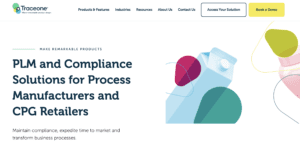Trace One, a leader in product lifecycle management (PLM) software and compliance solutions for process manufacturers and CPG retailers, offers its clients tools to help achieve their Corporate Social Responsibility (CSR) goals.
CSR: A commercial and regulatory imperative for retailers and producers
Corporate Social Responsibility refers to all policies and initiatives undertaken by an organization or business to encourage sustainable development – and it is an area that is more important than ever for consumers. CSR encompasses three areas: environmental, economic and social. As part of their CSR approach, organizations look to use product lifecycle management (PLM) software to reduce their impact in these three fields to become a sustainable and virtuous part of society.
Over the years, CSR has become an unavoidable topic for businesses, forcing them to respond to the ever-growing demands of consumers. Environmental and climatic challenges, not to mention the realization that they have social and societal responsibilities, have put pressure on the business world to evolve. CSR is now a key issue for companies.
The importance of CSR has been increased further by public authorities who, in the wake of increased societal awareness, have in recent years started looking more closely at the social and ecological impact of businesses by significantly strengthening the standards and regulations that producers must follow while developing their products. As the European Commission recently stated, « public authorities, including the EU, have an important role in supporting and encouraging companies to conduct their business responsibly ». Therefore, the European Union has introduced over the last years a « mix of voluntary and mandatory actions to promote CSR ».e. Companies have no option but to follow these changes in the regulatory framework in their respective sectors and adapt their production methods accordingly – especially when it comes to the environment.
“CSR is a way for businesses to acknowledge the impact of their actions on society and the environment. Companies have an image to uphold,” said Dejan Popovic, a Technical Project Manager at Trace One. They must ‘commit to following best practices’ when it comes to environmental, social and economic issues, he added, while also adapting to changing regulations.
Environmental action at the heart of consumer concerns
The fight against climate change, and ultimately, the preservation of our planet, its natural resources and its ecosystems, make the environment the main CSR lever for businesses. That is the view of Laetitia Pires, Product Marketing Manager at Trace One. “For retailers, the most important dimension relates to environmental questions,” she said.
Consumer packaged goods retailers and manufacturers are obliged to develop and market products that take into account not only climate issues, but also challenges such as deforestation and sustainable resource management, but also product lifecycle sustainability. More recently, we have also seen the emergence of scoring systems that assign a grade to food depending on their nutritional qualities.
Retailers and manufacturers not only have to adapt to consumer demands, but they must also react in real time to rapidly evolving regulations on several different levels. Europe relies on European standards and their adoption into national law. However, in the US, each state can impose its own regulations on top of those established by the federal government, making the job of distributors and producers even more complex. This is notably the case of the California Food Safety acts, which ban four types of additives.
Sustainability has become a strategic objective for all product development stakeholders. This trend is driven by legislation changes and by growing customer demand that urges companies to refocus on commiting to sustainable development practices as well as product data transparency and availability to customers.
Trace One: Solutions for monitoring and optimizing the CSR impact of products
Faced with these issues and constraints regarding the development, manufacture and marketing of products, Trace One offers a Single Source of Truth (SSOT) platform to help manufacturers and CPG retailers create better owned and private label products faster, ensuring streamlined collaboration with suppliers, from idea to label. Trace One solutions structure product and packaging data to make it available at any given time, equipping users with the tools they need to monitor and analyze the data required for sustainability claims and/or declarations required by regulation. They can then leverage this data to make changes to their sustainability goals and overall CSR strategy. Trace One’s suite of software solutions enables all parties involved in the product development process to enter ingredient data in real time, allowing for total traceability and visibility across the entire product lifecycle. A harmonized PLM and compliance system guarantees that all products meet regulatory requirements and retailer objectives – particularly regarding environmental issues.
Inside of its PLM solution, Trace One also offers a dashboard-based packaging management solution to help companies comply with new regulations for sustainable packaging design as well as meeting consumer expectations for less plastic use and general packaging waste. Trace One’s powerful dashboards work to identify any missing information, while also assessing the validity of subcontractors’ certificates, product recyclability, nutrition and health issues, as well as applicable regional and local laws (Trace One’s teams are constantly updating relevant legal frameworks worldwide).
“We help businesses calculate their environmental footprint and reduce it by combining their products with other options which have a less negative impact. We are looking to protect people, limit climate change, reduce greenhouse gas emissions and promote renewable energies and recycling,” Popovic concluded.
To learn more about Trace One solutions, visit traceone.com
Read more:
Trace One: Solutions to optimize the CSR potential of products

